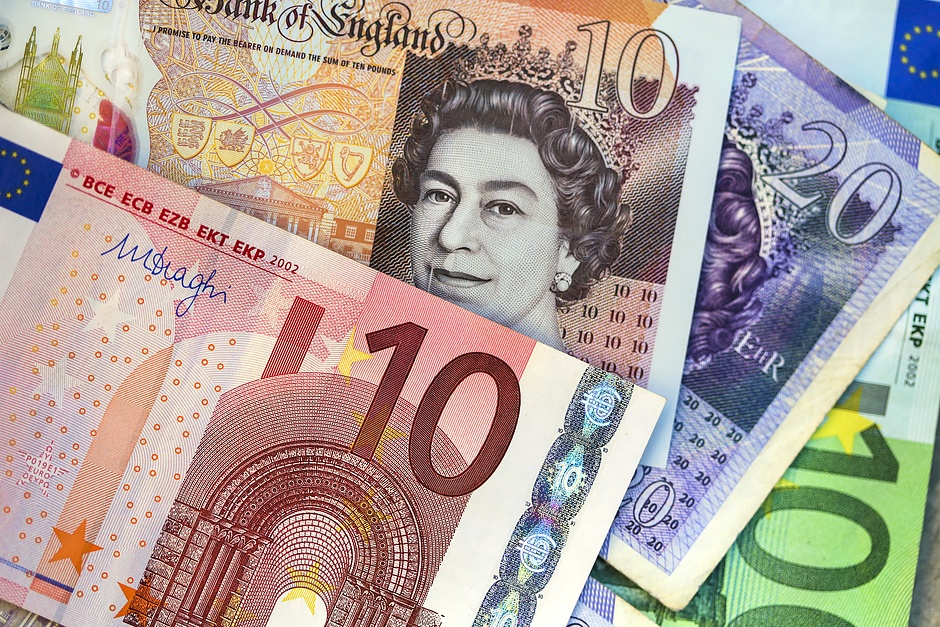EUR/GBP holds position above 0.8500 ahead of UK, Eurozone PMI data
- EUR/GBP moves sideways as traders adopt caution ahead of PMI figures from both economies.
- ECB officials adopt caution about committing to a rate-cut path due to concerns over inflation rebound.
- UK’s recent inflation and employment data have strengthened the argument for the BoE maintaining the rate at 5.0% in September.

EUR/GBP attempts to retrace its recent losses from the previous session, trading around 0.8520 during Thursday’s Asian hours. The upside of the EUR/GBP cross could be attributed to traders’ expectations of the European Central Bank (ECB) gradually lowering interest rates. However, ECB officials have been cautious about committing to a specific rate-cut schedule due to concerns over inflation rebound.
The likelihood of an ECB rate cut was strengthened after Tuesday’s Harmonized Index of Consumer Prices (HICP) data from the European Monetary Union (EMU) showed no month-on-month change for July, as expected. Additionally, the Core HICP decreased by 0.2%, matching the decline observed in June. Traders are now closely watching the Purchasing Managers Index (PMI) reports for the Eurozone and Germany, due to be released on Thursday.
In the United Kingdom, recent inflation and employment reports have strengthened the case for the Bank of England (BoE) to maintain the interest rate at 5.0% in its upcoming September meeting. This development may have given a boost to the Pound Sterling (GBP). Furthermore, Rupert Thompson, Chief Economist at IBOSS, indicated that "The BoE is expected to keep rates steady in September, with any potential rate cut likely being delayed until November."
On Thursday, the release of UK PMI data will be pivotal for the British Pound. The Composite PMI is anticipated to rise to 52.9 in August, up from the previous reading of 52.8, reflecting expected growth in both the manufacturing and services sectors. Stronger figures could reinforce the case for the Bank of England to maintain its current interest rate in September.
Euro FAQs
The Euro is the currency for the 20 European Union countries that belong to the Eurozone. It is the second most heavily traded currency in the world behind the US Dollar. In 2022, it accounted for 31% of all foreign exchange transactions, with an average daily turnover of over $2.2 trillion a day. EUR/USD is the most heavily traded currency pair in the world, accounting for an estimated 30% off all transactions, followed by EUR/JPY (4%), EUR/GBP (3%) and EUR/AUD (2%).
The European Central Bank (ECB) in Frankfurt, Germany, is the reserve bank for the Eurozone. The ECB sets interest rates and manages monetary policy. The ECB’s primary mandate is to maintain price stability, which means either controlling inflation or stimulating growth. Its primary tool is the raising or lowering of interest rates. Relatively high interest rates – or the expectation of higher rates – will usually benefit the Euro and vice versa. The ECB Governing Council makes monetary policy decisions at meetings held eight times a year. Decisions are made by heads of the Eurozone national banks and six permanent members, including the President of the ECB, Christine Lagarde.
Eurozone inflation data, measured by the Harmonized Index of Consumer Prices (HICP), is an important econometric for the Euro. If inflation rises more than expected, especially if above the ECB’s 2% target, it obliges the ECB to raise interest rates to bring it back under control. Relatively high interest rates compared to its counterparts will usually benefit the Euro, as it makes the region more attractive as a place for global investors to park their money.
Data releases gauge the health of the economy and can impact on the Euro. Indicators such as GDP, Manufacturing and Services PMIs, employment, and consumer sentiment surveys can all influence the direction of the single currency. A strong economy is good for the Euro. Not only does it attract more foreign investment but it may encourage the ECB to put up interest rates, which will directly strengthen the Euro. Otherwise, if economic data is weak, the Euro is likely to fall. Economic data for the four largest economies in the euro area (Germany, France, Italy and Spain) are especially significant, as they account for 75% of the Eurozone’s economy.
Another significant data release for the Euro is the Trade Balance. This indicator measures the difference between what a country earns from its exports and what it spends on imports over a given period. If a country produces highly sought after exports then its currency will gain in value purely from the extra demand created from foreign buyers seeking to purchase these goods. Therefore, a positive net Trade Balance strengthens a currency and vice versa for a negative balance.
Author

Akhtar Faruqui
FXStreet
Akhtar Faruqui is a Forex Analyst based in New Delhi, India. With a keen eye for market trends and a passion for dissecting complex financial dynamics, he is dedicated to delivering accurate and insightful Forex news and analysis.

















